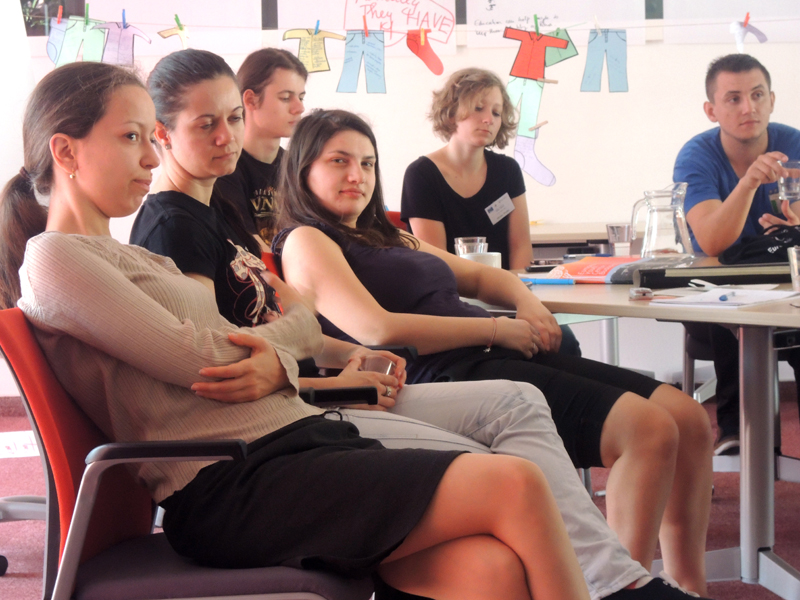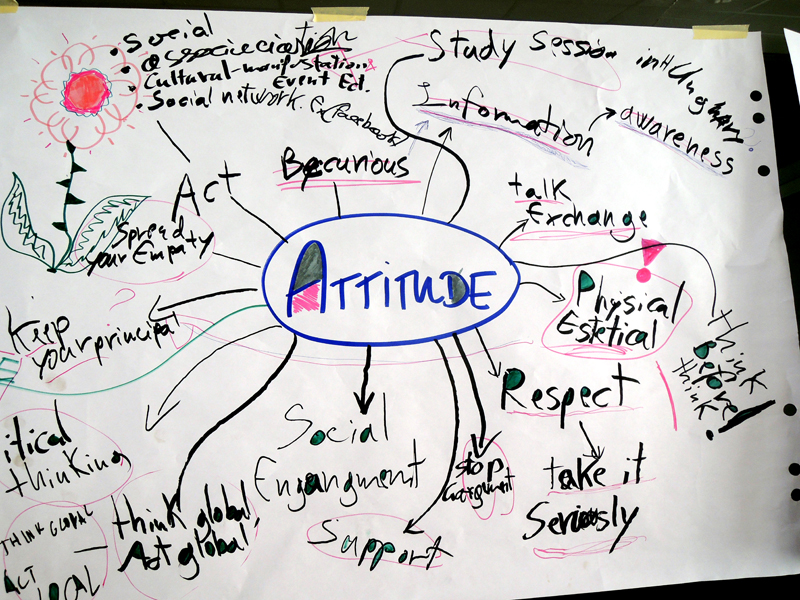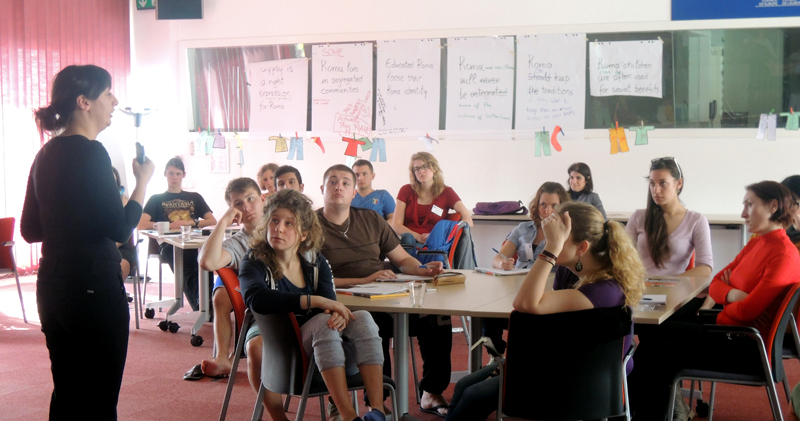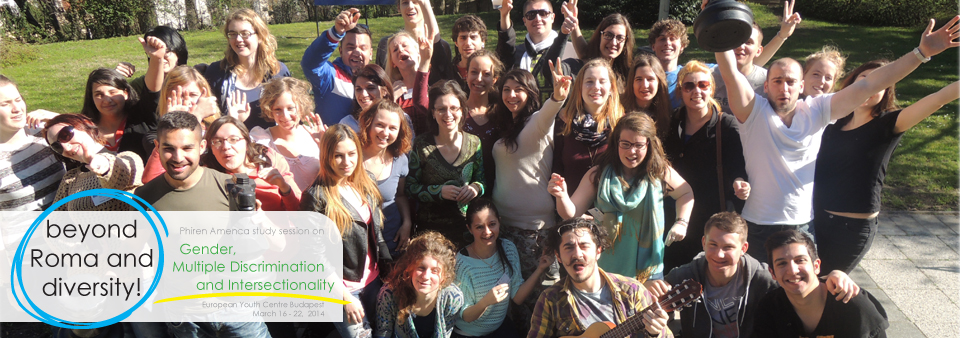“Beyond Roma and Diversity!” Study Session report by Phiren Amenca volunteer Clémence Neyrat
To write this report I referred to some parts of the presentation of our trainers, structured and completed with personal understanding. I chose to focus on “attitude” because it is a transversal concept we could face all along the study session and which I found particularly interesting on a personal level. As example, I used some games/exercises/methods developed during the seminar. The participants’ attitude as such illustrates this approach. [hr]
I. Awareness
 1) of the diversity
1) of the diversity
“Diversity can be a problem as long as we are not aware of it”
If some decision-makers and media try to homogenize our societies, diversity is a fact. The difficulty lies in considering diversity as richness and not as a problem we have to solve. To promote this vision, we need to approach diversity with a clear desire of understanding and awareness. By getting informed, ambiguities and misunderstandings tend to disappear, what clearly simplifies relationships between us.
Example (given in the seminar) : the silence doesn’t have the same meaning according to different cultures. In Western Europe in general “be silent” means that people are not allowed to talk. On the contrary, in Greece for example, the same injunction means that people are allowed to talk to each other with a lower volume.
We can find many examples illustrating the same issue: speaking rules, norms of politeness, greetings, gestures, expression and self-expression, feelings externalization etc.
Connected to the topic “gender”, in our society it is usual to differentiate between man and woman but in other societies we can sometimes find three or more gender.
Be aware of the diversity is also connected to our personal identity, personal development.
We belong to different groups (not to understand as fixed and closed groups), and our roots, our culture also help us to define ourselves.
2) of our personal cultural identity
To get more understanding, the first step is the awareness of our own identity. How can I understand the others if don’t understand myself and the freedom inherent in being human? Identity is an abstract concept, it doesn’t have the same resonance for everybody. Identity includes different elements particular to each of us.
*Flower petals game* Some people identify themselves by nationality for example, others don’t attach importance to it. We realized that « the groups » to which we belong are many and diverse. In every area of our lives, we are put by the others into « categories » (be a woman, be a man, be young, be old, be rich, be poor, be a student, be a worker, be a local, be a foreigner etc.). It has a real influence on us and of course we share common values with other individuals but the most important is to be aware of the freedom for everyone to identify oneself as s/he wishes.
For example: some people can say « it is a woman » but the person it is referred to may not identify oneself as a woman. It is important to know who we are and what is relevant for us to take into account in order to identify ourselves. Am I a woman? Am I a student? Am I Hungarian? Do I want to identify myself as woman/student/Hungarian? etc.
It can be healthy and helpful to relate to one or other group since we choose to do it.
–> Awareness of the choice and individuality
3) The head/heart/hands model (presented by Maria)
If used by leaders and politicians, this model can apply to us also.
This model allows us to notice three dimensions of behavior:
1) Head (cognitive understanding)
2) Heart (affective state)
3) Hands (competence to act)
People react more or less with one of this factor (some people prefer to rationalize everything, other consider their feelings at first, others just believe in acting) but it is important to realize that a real change includes the three elements, and we all work with this combination.
This has been proven a day later during *the agree/disagree game* where we could clearly see the influence of the feeling. I really like this game because it shows that in many situations, feelings play a major role, we don’t have time to analyze all parameters but we have to take position, even make a decision sometimes. Why feelings are involved? One reason is because we associate a concept with a personal situation. If this game is a bit radical it was interesting to see which is the first opinion coming into our mind. We reversed the process, we took position and then we argued why it is the good one.
–> a change includes : 1) coming to Grips; 2) working through; and 3) adaptively sustaining
That’s why *the forum theater* is a very good exercise because it allows us to get aware of the situation, it involves our feelings (of course it was also different for the person who experienced this situation in reality) because we are spectators in a violent scene and then we can many times adapt our behavior to see if it improves the situation of the victim. The aim is to be able to reproduce this attitude in reality when sometimes we also don’t have time to think about all consequences, and because too many times people are passive onlookers during a discrimination act or a manifestation of hatred. We concluded that the priority is the immediate safety of the victim. [hr]
II. Attitude towards the others
 1) Flexibility (cognitive and behavioral) and openness (to others and to new experiences)
1) Flexibility (cognitive and behavioral) and openness (to others and to new experiences)
Here, this can mean to extend our comfort zone, not be afraid to do unusual things, to go abroad, meet and talk with people, to try new activities, new food, new music etc. Even if we can feel reluctant a priori, that’s how we can discover the most and get surprised.
All agreed that volunteering is one of the ways to realize it. It is not only going abroad, it is being an active citizen, to get involved in a completely different community, to discover another culture and sometimes to undertake tasks or projects we would never have had the chance to deal with in another context.
Flexibility, openness, and willingness are required, because a change is up to us also.
We decide to change our attitude and to get more open. Then we can also share our personal experience with others and ask relevant questions to make people react.
2) Respect, tolerance
We have to respect other ways of thinking and take them seriously. Indeed simple “jokes” can hurt other people.
It is important to be able to disagree but the expression of disagreement must be respectful. At the beginning of the seminar we clarified one more time that “I don’t agree” doesn’t mean “I don’t like you”.
We had a very interesting discussion with the group that had to write guidelines about “attitude”. We were divided into two positions. The first one was that we have to keep our style (haircut, clothes, tattoos etc.) , do what we want to do in order to express our identity. Some of us thought that stopping hiding ourselves is also a way to change the society. The second one was that we cannot do everything in every society according to the local culture, the religion, the history and we cannot take the risk to shock people, in particular if we want to integrate and keep the intercultural dialogue. Some of us expressed that they don’t like to be stared at on the street, others think that it is not a big deal compared to the gained freedom.
We arrived to the conclusion that it is important to be ourselves and keep our style as long as it is not offensive towards others. We have to think of the consequences and make conscious choices. In other words, we could say it is important to balance : see how important things are for us, and keep respecting the fact that for others it might be more complicated to assume a choice.
3) Empathy (and not interpretation!)
Change our perspective! Try to think through the others eyes to really understand what they experience and what they feel. [hr]
III. Communication
 1) Verbal and non verbal communication
1) Verbal and non verbal communication
On the way of mutual understanding we also have to develop our communication skills.
We realized the importance of the communication during an exercise. *Color group game without verbal communication*
The only instruction was “group yourself” : we stayed stuck because of the paper put on our back, and focused on the difficulty of the lack of communication instead of thinking of the different possibilities offered to us.
It helped also to understand the exclusion process (everyone wanted to find his/her place and rejected the people with other colors, it created also a solidarity between individuals belonging to the same group). Also we had to trust people because we could not see the color put in our back.
No just verbal communication is important. Behaviors like support, positive attitude, smile, attention on the presence of the others and giving them space, play an important role.
2) Clearness
A good communication between groups starts with the clarification of the concepts.
* agree/disagree game* All of the group agreed that before taking position it is important to understand the terms in the same way, not using words we don’t understand or we are not informed about.
They are always many interpretations, we can understand the proposed sentences as things how they are in general, or how a lot of people experience them, or how we want them to be.
Ex: One example was “gypsy is another term for Roma”
First interpretation, we can understand that sometimes Roma are called like this (without consideration of the appropriateness), or we can start a debate about the question if it is right to call Roma “gypsies” or not.
We realized that the culture and the language as a whole play a fundamental role.
“Roma “is a common agreement, it is also the politically correct form that we decide to use, also because some Roma felt hurt, even insulted with the term “gypsy” associated to negative images. But other Roma don’t see it as a problem but as a normal word (in particular, in Hungarian “cigány” is the most used expression) and don’t identify themselves as Roma (one participant story: this person explained that in her/his family the grandparents even don’t know anything about this word). We concluded that it is important to respect both explanations, and when in doubt, keep using “Roma” (also on international level and in public sphere).
3) Stop assumptions
It might be difficult to avoid making assumptions because it is how humans react when they meet with people.
Anyway it is fundamental to ask instead, to be curious of the diversity and to get correctly informed in order to be aware and to understand.
[hr]

“Beyond Roma and Diversity! Phiren Amenca Study Session on Gender, Multiple Discrimination and Intersectionality” ran from March 16 – 22, 2014 at the European Youth Centre Budapest, Hungary.
[hr]

